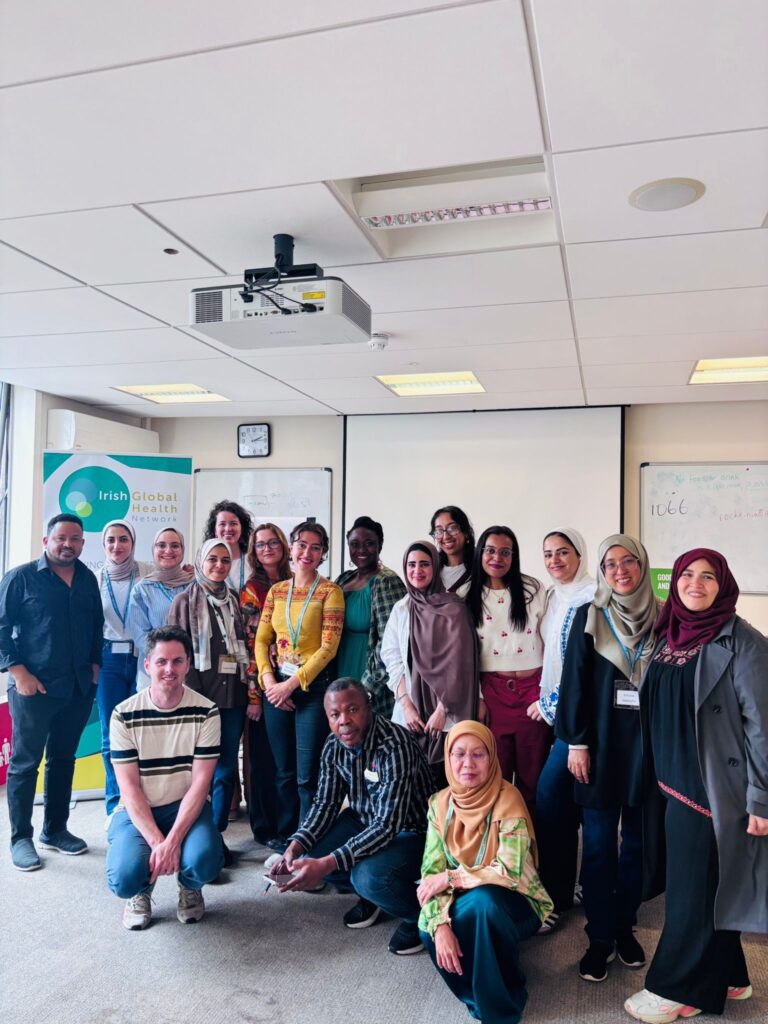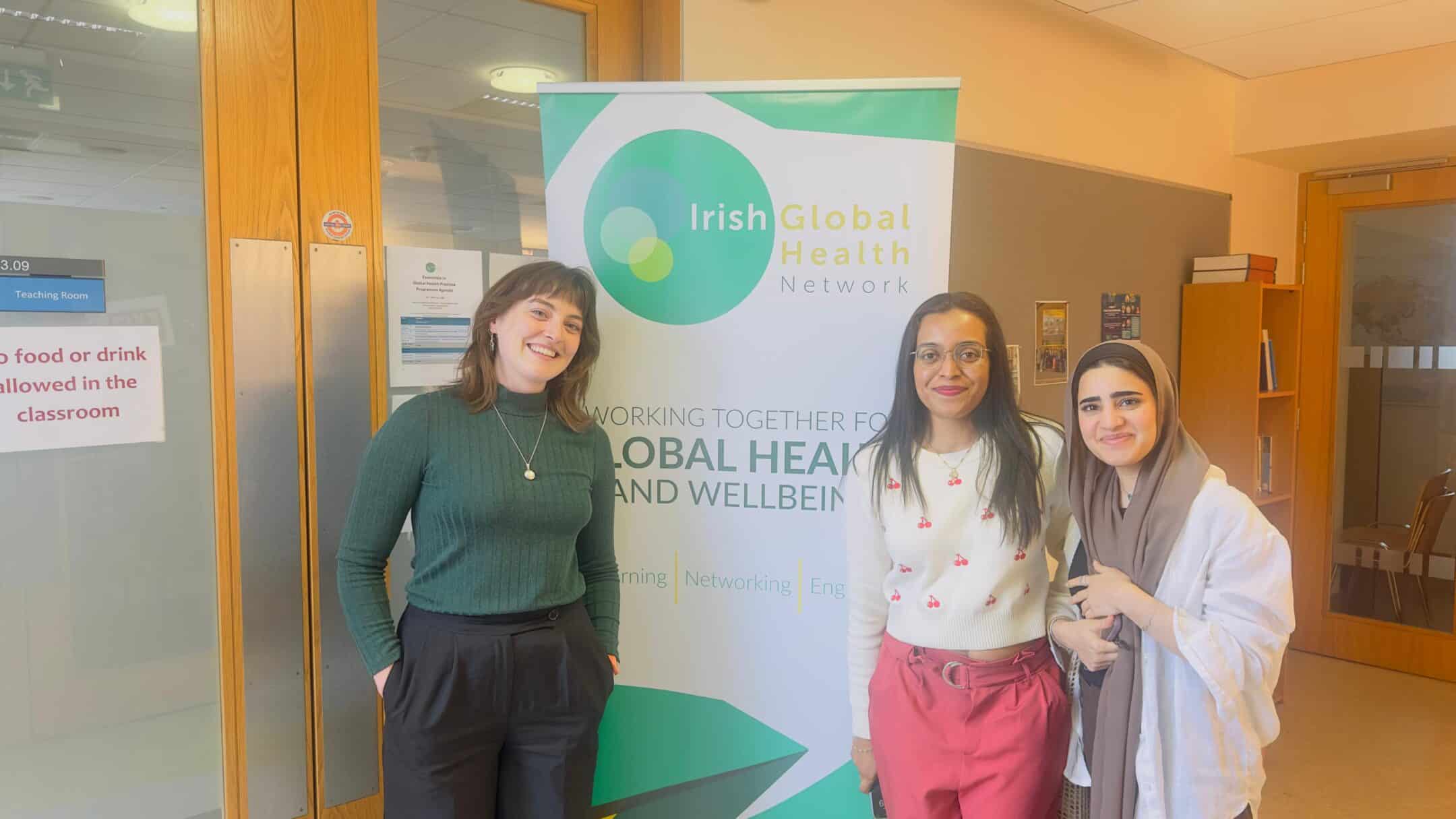Global Health Without Borders: Reflections on the Power of Diverse Voices
By Ashvirni Gliberth, July 2025
Networking Beyond the Name Tags
One of the most rewarding aspects of the Essentials of Global Health Practice Summer School 2025 was the people. We came from across the globe—Europe, America, Africa, Palestine, the UAE, and Australia—bringing expertise in medicine, dentistry, public health, policy, economics, and even medical science liaisons from pharmaceutical industries. Our diversity made every conversation richer. Informal exchange from lunch chats to coastal walks in Howth taught us as much as the lectures. I’ll never forget sitting with peers from four continents discussing maternal care from rural Ethiopia to high-tech Norway. Peer learning was at the heart of it all. We leaned on one another’s insights, swapped contacts, and built a global network.
Summer School 2025 was the people. We came from across the globe—Europe, America, Africa, Palestine, the UAE, and Australia—bringing expertise in medicine, dentistry, public health, policy, economics, and even medical science liaisons from pharmaceutical industries. Our diversity made every conversation richer. Informal exchange from lunch chats to coastal walks in Howth taught us as much as the lectures. I’ll never forget sitting with peers from four continents discussing maternal care from rural Ethiopia to high-tech Norway. Peer learning was at the heart of it all. We leaned on one another’s insights, swapped contacts, and built a global network.
What stayed with me most was the openness, generosity, and collective drive to make a difference. Global health is about people—and in this course, I met some of the best.
Lessons Beyond the Lecture Hall
The course brought together a stellar lineup of lecturers whose insights challenged and reshaped my thinking.
Robbie Lawlor’s session on advocacy stood out; his unapologetic voice blurred the line between lived experience and systemic critique. I finally understood the strategic nuance between activism and advocacy, and how both are essential to health justice.
Bronwyn April’s session on equity and decolonisation introduced the concepts of “power over,” “power to,” “power with,” and “power within.” Her retelling of the Goldilocks story struck me deeply—questioning why we automatically see her as the protagonist, and challenging us to rethink which voices we centre in global health narratives.
Coming from a surgical background, I connected deeply with Dr Umair’s discussion on global surgery and equitable access to care. His striking example that a single laparoscopic cholecystectomy consumes the energy of 15 car trips around Ireland made the environmental cost of surgery tangible, prompting me to rethink sustainability in practice.
From Theory to Impact
The course content exceeded expectations, blending theory with real-world application. Case studies were examined from vaccine equity in Palestine to food security in Malawi, bringing concepts to life. I expected academic depth but was challenged by justice-based discussions on power, decolonisation, and intersectionality. Environmental health, WaSH, and sustainable surgery were framed as urgent and actionable.
Why This Course Was Personally Transformative
Learning about health assessments in fragile and conflict-affected settings such as rapid needs assessments and detailed surveys equipped me to collect meaningful data in difficult contexts.
Health system analysis tools, drawn from the ASPHER Global Health Curriculum, helped me link global priorities to local realities; just as I aim to do in my future surgical practice. The polio vaccination case in Palestine underscored the value of advocacy amid political instability. Practical tools like METHANE reporting and 10-second triage strengthened my emergency preparedness.
But more than knowledge, it prompted personal reflection. I had to confront my biases and examine the systemic inequities that persist in health access. It reminded me that clinical excellence alone isn’t enough; cultural humility, systems awareness, and social justice are essential.
Confronting Power and Inequity in Global Health
Power, race, and resource disparities were central. Eunice Tolu’s talk on “Leading with Health Equity” emphasised that transforming health systems takes courage, power, and shared humanity.
Nadine Ferris of IGHN reminded us that health is global; not just in the transmission of disease, but in justice, climate, and economic systems. The course didn’t just mention Global South voices—it centred them.
Yes, it was uncomfortable at times. We explored privilege, bias, and cultural assumptions. But it was within that discomfort that I grew most.
Connecting the Dots: Systems Thinking and The Immersion Experience
The immersive format brought intensity and depth. Sessions flowed one after another with little time to digest, yet the constant engagement fostered resilience. I remember one afternoon, after hours of evaluating design frameworks and exploring intercultural awareness, I felt mentally exhausted but intellectually alive—a paradox that speaks to the course’s power.
This wasn’t passive learning—it was grappling with complexity in real time, building not just knowledge, but adaptability and insight.
Learning Together and Looking Ahead
Dynamic lectures, breakout group debates, and informal conversations consistently challenged me to question assumptions; especially about cultural competence and health equity. One spirited discussion on vaccine hesitancy opened my eyes to community concerns I hadn’t previously considered, revealing the importance of listening before intervening.
5 Things I Wish I Knew Before This Immersion:
1. Listen more than you speak—real learning happens here.
2. Lean into discomfort—it’s the gateway to growth.
3. Know your basics, but keep your mind wide open.
4. Build authentic connections—they’ll shape your journey.
5. Journal your insights—reflection fuels progress.
Conclusion 
The Essentials of Global Health Summer School 2025 was transformative; academically, professionally, and personally. From power dynamics and decolonisation to sustainable surgery and emergency response, the course challenged and equipped me to contribute meaningfully to global health.
As an aspiring surgeon, I now carry with me not just clinical tools, but a deeper commitment to equity, advocacy, and system-wide impact. With humility, curiosity, and resolve—I’m ready to continue this journey.
CATEGORIES
- Restore Humanity Campaign
- Equity in Action Blog
- Training Programmes
- Sponsorship
- Vaccine Equity
- Get Global – Global Health Talks
- Student Outreach Team
- Get Global Young Professionals Talk Global Health
- Global Health Matters – Live Event Series
- Global Health Matters – IGHN Live Event Series
- An initiative of Irish Global Health Network
- ESTHER Ireland and ESTHER Alliance for Global Health Partnerships
- Global Health Matters – Webinar Series
- ESTHER
- IGHN Conferences
- Global Health Conference 2020
- Women in Global Health – Ireland Chapter
- ESTHER Partnerships
- Weekly Webinar Series
- 4th Global Forum on HRH
- Access to Medicines
- Archive Page Weekly COVID Webinars
- Clean Cooking 2019
- Climate Change and Health Conference 2017
- Conference Abstracts
- Conference Materials
- Covid FAQ
- COVID Funding Opportunities
- COVID-19
- COVID-19: Gender Resources
- Dashboard and online resources
- Education
- ESTHER Alliance
- Events
- Events & News
- Funding covid
- Global Health Exchange 2018
- Global Health Exchange 2019
- Global Health symposium 2019
- Health Workforce/HRH
- Homepage Featured
- Homepage recent posts
- IFGH 2011-2012 Conference and Events
- IFGH 2014 Conference
- IFGH Multimedia
- Irish AIDS Day 2017
- Irish News and Feeds
- Key Correspondent Articles
- Key Correspondent News
- Maternal Health
- Multimedia
- News
- News & Events
- Newsletter
- Opportunity
- Our LMIC's Resources for COVID19
- Partner Country News and Feeds
- Past Events
- Policy
- Presentations
- Recurring events
- Reports & Publications
- Research
- Resources
- Student Outreach Group
- Students Corner
- TEDTalks
- TRAINING COURSES FOR HEALTH CARE PROFESSIONALS
- Uncategorized
- Upcoming Events
RECENT POSTS

Impact testimonies- Lombani

Impact Testimony – Shadrick

Power, Inequality, Decolonisation – and Living My Recovery By Bronwyn April

Global Health Without Borders: Reflections on the Power of Diverse Voices

IGHNxEU – Empowering Women for a Healthier Europe

